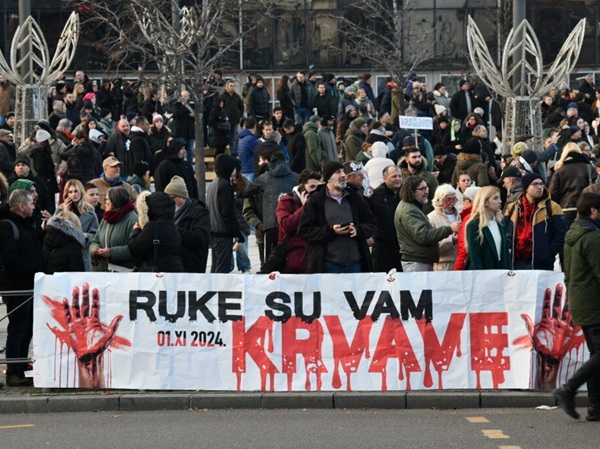PRMI reporters spoke to student activists from Novy Sad, in Serbia.
For security reasons the students’ names are withheld.
In November last year, the recently reconstructed Novi Sad railway station collapsed, killing 15 people. A sixteenth, a student, died from his injuries later. Since then the whole country has been shaken by mass student-led protests. They forced the resignation of the government led by Prime Minister Milos Vucevic in the spring. In August repression was stepped up as riot police attacked demonstrators, who, in the words of one participant, found themselves “unarmed against bayonets”.
As students return for the new academic year, University authorities are relying on the riot police in an attempt to defeat the movement. At the time of writing the protests are continuing.
Station collapse sees mourning turn to anger
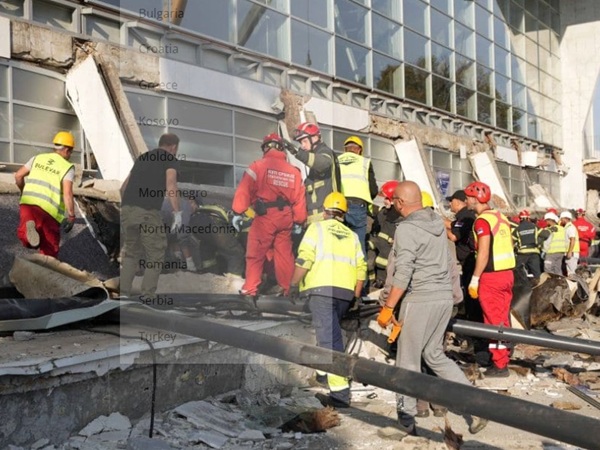
PRMI: The horrific tragedy at the Novy Sad Station in November last year has led to a huge student-led movement that has shaken Serbia for nearly a year. Why has this disaster provoked such anger?
Response: The disaster proved to be a breaking point. Before that there had been many other accidents, and we didn’t react. In 2015, for example, there had been a terrible helicopter accident in which a baby and medical team died, because the pilot was expected to break procedure and land at an airport where government officials were waiting for a media photo opportunity and promotion. There had been a lot of horrible things, but we did nothing. But November’s tragedy was when we had to say “enough is enough”. We realised that everything that happens here is not just an unlucky coincidence, but the reality of how we have to live.
Anyway we knew how the station had been renovated, what had been renovated. After all, many people passed by the station everyday. We had friends who used to use the station every day, we often went in to sit and relax there. So when they first refused to defend their actions, to apologise, claiming that there had been no renovations on that part of the station we knew differently. Their lies were not going to work.
When we heard the news, we were thankful that it wasn’t anybody we know. We went out onto the streets almost unconsciously. Many were just talking and looking up as if expecting something to fall. The feeling was this is not normal, it’s horrible, it could be us next time. People really lost what little trust there was left. Even those who didn’t think about politics or the government stopped and said we need to go out on the streets. They had crossed a line that should not have been crossed, the amount of lies coming from the government simply grew. They kept contradicting themselves.
Everybody took things really personally, none of us could think of anything else but what had happened at the station and about how so many people had lost their lives because the government had not done its work properly, they were only interested in saving money, and making more. People could no longer stay silent, they started to remember everything that had happened before. And about the careless way the government treated the people who live in this country.
More than just corruption
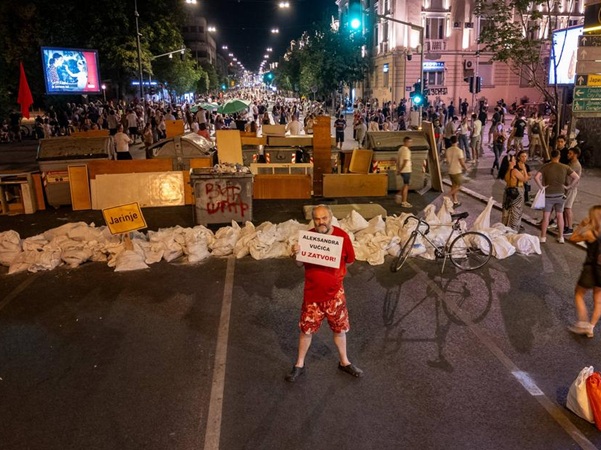
PRMI: In the few articles that appear in the international media, they usually say the main issue is corruption. Is that true?
Response: Of course there is corruption. But that wasn’t how it started. We cannot lie about it, but the question is how did it become so huge? The key thing was that it had become personal. It felt like next time it is going to be us. Some member of our family, maybe next time a brother or sister, or our friends.
This is what made people say enough is enough. We have suffered our fair share of things, we had been quiet for too long, and now was the time to speak up. It started then as an act to remember those who lost their lives under the canopy. We started by going out everyday to block the streets for fifteen minutes, to mark the fifteen who died, which then unfortunately grew to 16.
While we were doing that the attacks by these mysterious people started. They attacked the students in Belgrade. We actually knew who these thugs were. They usually worked for the government. Their attacks provoked us to step up the blockades. Now the demand was raised to publish the papers, the contracts. So of course we understood there was corruption.
But there is so much wrong for us to see. The evil is now so deep, and we are so far into the revolution that we see that corruption is only the tip of the iceberg, just one of the methods they are using to abuse us. We are living in a collective nightmare. And everyone, the whole world is experiencing it. The longer it goes on, the harder it will be to clean up the consequences of their actions.
And it’s more than corruption. It is how they lead the country, ignoring any laws. They break the law every single day and, using the media to cover their actions, they are simply autocrats. The thing about autocracy in Serbia is that our leaders today, those who are in government, are the same as those who took us into war in the 1990s.
PRMI: You spoke of how at the start, the protests were mainly a remembrance for those who died, but as time went on people became more and more angry. Now there is the demand for the transparency of contracts, the release of those arrested. There is the demand for a 20% increase in the education budget, and now the demand for new elections. Why do you think they have evolved so quickly, so far?
Response: Because everyday there is new shit being done. We have a different relationship with these demands, in the sense that everyone is approaching them from a different angle. They are very precise, but at the same time metaphorical because if they are to fulfil these demands, they would need to arrest themselves. So if you were to ask why are these demands getting bigger and bigger everyday, it is because the process never ends of finding out the extent to which this country is fucked up.
Regime tries intimidation and fails
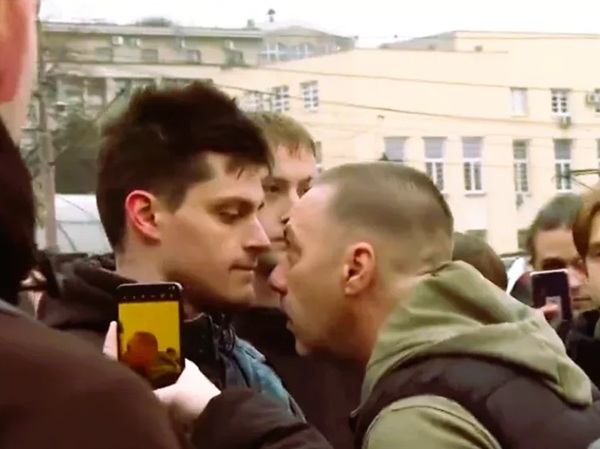
PRMI: You spoke about these people who came to attack the demo.They’ve used all sorts of measures and threats against you. There’s been pro government demonstrations. Thugs attacking the protesters. They accuse you of organising a coloured revolution. Do any of these attacks on you have any real effect?
Response: Not much. In general, I would say this is part of the Serbian character, a certain talent, but also our bad side. We are really reactive. If we are attacked then we respond even harder. We are currently in a phase of re-organising because ‘he who shall not be named’ is stepping up police violence. This week we are witnessing the break up of the autonomy of universities. In Novi Sad the police are moving into the universities to break up the occupations.
Workers join the protests
PRMI: There has been significant support from different sectors of workers – teachers and professors, but also many others. How has this been organised?
Response: This is the best part. It has been largely self-organised. There has been a huge collective transformation. The cathartic moment was when the students were walking all over the country, from one city to another, up to 100 kilometers, walking for days and nights and going from city to village to visit everybody. People were preparing the food and drink, giving us places to sleep. If you had said before this would happen I would have cut my hand off in disbelief, but now everyone is hugging and kissing.
This woke everything up. Until now, we still have people active in helping the whole movement, not only students. Yes, there are less people involved now, but people still recognize the need for change. They see in the students hope, because I guess we are young, we got involved as someone had to do something.
And as students we felt OK, what do we have to lose? Definitely less than somebody who has, I don’t know, kids and family, a career and stuff. When we said OK we are going to do something, others wanted to be part of it and helped us in any way they could. We had people cooking for us, they are still cooking for us as we were locked into our universities. During the occupation we basically slept there, lived there.
People started to organise their own groups. Lawyers came to help defend us from the start. Professors and teachers supported us. Other staff gave us the keys to the gallery so we could organise there. They did their best to help in any way.
We had a lot of talks with them,because when we started, we didn’t know what to do. Sometimes we spent hours and hours discussing, because we couldn’t reach a conclusion, so we’d call other people, professors, friends to give us advice so we could be better organised and more productive.
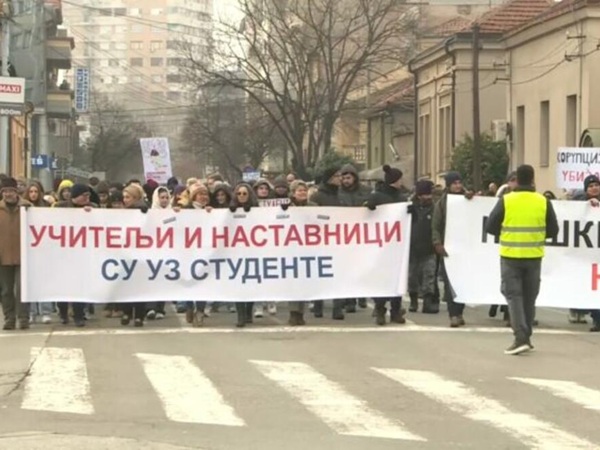
PRMI: Does that mean that when you got support from the workers, it was on the initiative of the trade union structures?
Response: No, we actually ignore the power of these structures because they are under the control of the leading party structures. OK, some are healthy, some of them not, but most of them are basically formed with the aim of calming people down, keeping them quiet.
In the same way when we first started, we didn’t really want to immediately demand new elections because we weren’t prepared for it. Firstly, we didn’t know how it was possible to overthrow the government. But then we asked if that happened, what’s gonna come next? When we saw the options, we weren’t happy at all because we had no options. For us, there was literally no option. It’s either bad, or worse, and you can’t choose between bad and worse. So we decided if we’re gonna really do something, if we really want to change, let’s do something that’s going to really change. So that’s why we decided to organize among ourselves. Let’s see who we are as a people and what we as normal citizens can do.
Legacy of the past
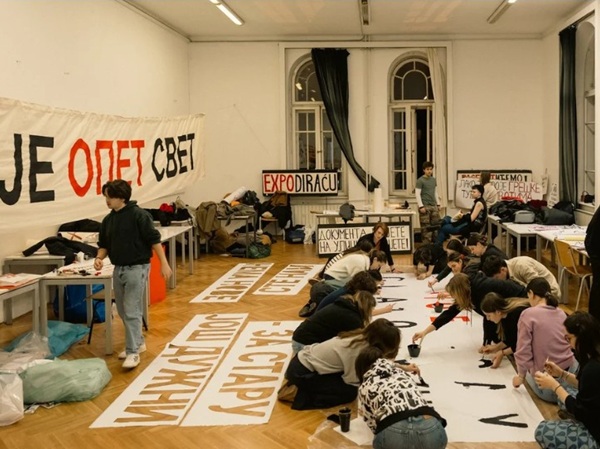
PRMI: One of the banners displayed on a demonstration in the capital read “Beograd je opet svet” [Belgrade is the world again] – echoing the “Beograd je svet” [Belgarde is the world] raised during the anti-Milosovic campaign of 1996-7. How have the experiences of the 1996-7 generation, many of whom will be the parents of today’s youth, influenced your protests?
Response: This is a big topic. When it comes to our parents or our older brothers and sisters who were youth in that period I would say they are pretty depressed about the future of this country. They think that they already demonstrated yet nothing changed. The slogan itself is ambivalent – it brings up two different emotions. Of course it brings up new hope, but also the question hope for what? I think the new generation are no longer satisfied with evoking the nostalgic feelings of our parents and our older brothers and sisters, as their hopes were pretty easily broken.
Just today I was thinking about the difference, what is the major difference between the generation of 96 and this generation 0f 2025? I would say that this generation, although it is a huge movement full of huge emotions, you do not see the same lack of clarity in people’s eyes. They do not believe in things so blindly as in the past. People think through things very quickly and figure things out.
We also have to say ‘Yes, Belgrade is again the world’, but the world does not support Belgrade. We are very aware of the fact that we are alone. And that raises the question ‘what does it mean that Belgrade is the world again? In what sense? I mean the whole world is in this shitty situation – is that what the placard was meant to say?
But there is another side to this. We marched from Novy Sad to Belgrade – that’s almost 100 kilometers. There were thousands and thousands of people waiting and cheering. The place was full of life, as if they had laid down a red carpet for us. Then we felt that in Belgrade the whole world was ours. We felt the whole world was watching Belgrade.
PRMI: You have raised some really interesting issues here. I am a socialist, always have been and always will. But there was an opinion poll last week that asked Russians what sort of society they would prefer to live in. Nearly half said a socialist society, and less than 20% said capitalist. But of course the older generation associate ‘socialism’ with what existed in the USSR before. What do you feel about socialism?
Response: We are still forming our opinions on this particularly as our parents are still alive and still coming to terms with the experiences of the particular system that existed here in Yugoslavia – both good and bad. My feeling is that there is no perfect system, whether socialist or capitalist. For me now, and time goes differently during a revolution than in peaceful times, if there are ever peaceful times, each of these constructs has a relevance for different aspects. Some aspects should be treated in a socialistic way, others in capitalistic, others maybe in a radical liberal way. I would not say that any of these concepts are good per se, because implementing them in that way would be dogmatic, rather than using them to make our lives better. The difficulty with using this spectrum is that socialism is used, or I should say misused to restrict basic human rights. So I think if we could have socialism with the basic human rights, that would be the biggest revolution we could have. The problem is that capitalism intervenes to exploit our basic needs for the sake of money.
Thinking about socialism as a concept although I am not pro or anti, I think that I am changing my opinion a bit. Our opinions before were influenced by the older generations, some who thought how beautiful it was under ‘socialism’. Others said this was the worst time of their lives and wanted capitalism but completely ignoring the depths to which we have now sunk. We are still making our minds up, but hope that whatever happens we do not end up in another state which hero worships its leaders rather than making rational decisions.
PRMI: There has been a lot of criticism of Chinese companies who were involved in the reconstruction of the station.And at the same time, the European Union has barely registered the protests and calls on you to “deescalate” the protests. How do you view the role of the different international powers?
Response: It’s a good question, with an angry answer. I’m angry. You know we like to be a romantic people, with heroes and saviours, waiting for a king or the gods to show us the way blah blah blah. But we are dying in this constantly waiting. In these times we are slowly but steadily learning nobody will come to save us. Not China, America or the European Union. I’m not saying that we are against these countries, I’m just saying that in our situation, nobody will come or whoever comes, will only be to ask for something in return. That’s the whole point.
I was listening to a podcast, and the speaker proposed that we should start a strategic partnership with all countries that are now in revolution, Nepal, for example, and start conversations with those that are in a similar situation. No need to search anymore for suitable countries on the basis of economy or politics. That can help you with the problems that are not so specific. There is of course corruption everywhere, but some situations are specific. Every country has its own history, problems, and time-lines.
The thing is that we have done a lot of things to try and get support. There are a number of students on a bike ride to Strasbourg for example. It’s good that they went, but it is more symbolic to show other countries that something is happening, rather than an expectation that something will happen.
We have done a lot of things, but we found that when we speak with our friends from other countries, for neighbouring countries they tell us there is nothing in their media about what is happening here. So it makes us ask why? Even during the process in Serbia, even when the police violence was happening, it was not something you could follow clearly on the mainstream media. There are independent Television productions set up by students when the blockades started, we can only find the true situation by following them. So maybe we can’t blame other countries for not reacting as they do not know what is going on.
PRMI: I think the leadership of those countries are aware, but they have their own interests. The EU, for example, says you should ‘deescalate’ the violence’, but at the same time is pushing, together with your government, for the privatisation of education, which for them is a source of money. What would you think if they started privatisation?
Response: You know, whether it’s privatisation of education, or killing people on the streets, for us it’s the same thing! They can do anything they want, and we can’t have any opinion about it, you know. They are changing the law all the time, and if during dialogue they raise this topic, we cannot have a formed opinion while we are still in the situation when we are literally fighting for our lives. As they legalise the killings, it is quite possible they will legalise privatisation too.
But the topic is definitely on their agenda. They definitely want it, but I think they are stupid, they would not even know how to do it. Maybe in the EU there is a prepared structure, but here in Serbia I do not even know who would go to such universities, because if anyone wants to manipulate or bribe to get a diploma, they can do so anyway in the state universities. Of course for those who have money there may be some interest, and anyway there are already private universities which are abusing the system. But for the rest of us we don’t have the money to pay.
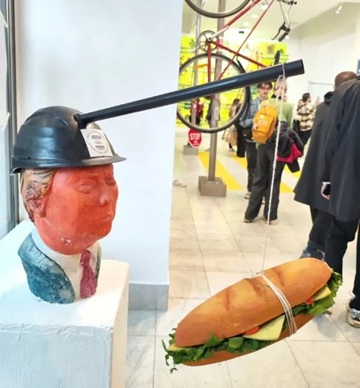
PRMI: On a different question I have seen, and don’t understand why, that students use the word “Index” on the protests. What is the significance of “index”?
Response: Ha! Any student who enrolls at university gets a registration card, called an “index”. At the start of the protests we would all wave our “index” cards to show we were students. But in Novi Sad there is a different meaning. The most popular local sandwich – toasted with ham, cheese and mushrooms – in Novi Sad is called an “index sendvič”. From the very beginning the leading party and “he who shall not be named” abuses our movement, any critique of the system by copying it – so they go the the rural areas, and fill busses with people who are paid, or blackmailed and are easy to manipulate so that they come to the city and stand in pro-government demonstrations. When they get here they are fed with the “Index sandwiches”. So we would mock them, calling them “sandwich people”, asking them to “choose your index”. Every revolution has its own phrase like that.
Democracy in action
PRMI: The protests are organised through what you call plenums in each university. Could you explain how they work?
Response: From the start to now the way the plenums have operated has changed. At the start anyone who had any proposal, anything to say could come and we would call a plenum for all students to talk about what is on the table. If there has been a plenum for a while, for a week or so we would call one just to see what is happening, what people are doing and to decide our next moves. When there is a topic that we think is important we hold a vote -a yes, or no or neutral. If the topic is super important we just have a yes or no vote. Sometimes there would be more neutral votes so we would come back to the topic later.
The role of the Plenums has also changed. At the beginning it would divide into different groups to raise donations, for cleaning, for street actions, for a lot of things. So at the plenums we would have reports on what had been done, and what should be improved on. But now there are less people involved, and the plenum has become more of a strategy work-group.
This is something that can be learned from the movement, because we are currently at a crossroads, where we don’t have such a large participation. So to some extent we have down-scaled our activities. I think this was because of the clash in Belgrade [when the riot police attacked the demonstration] on 28 June, because then it was clear that the power had passed from the students to ordinary citizens. So we stepped back a bit, said OK, we have learned a lot, we have shared responsibility, but we cannot be responsible for everything. So now we are rethinking things, reorganising and there of course are divisions amongst us about how we see the future of our struggle.
So as I said currently the Plenum does not have many participants. We talk of Novi Sad being a university town, it is. But we need to bear in mind that many come from outside the city, others from other cities and villages and in the summer they return home and will carry on there. So now we are discussing how we maintain unity. Is it time for us to unify the students, ordinary citizens, the professors into a mixed group.
When we started we based ourselves on what unites us, even though the liberals did not like the radical left, and the radical left did not like the liberals. That way ideology was kept to a minimum. But we also have different kinds of Plenum. In our faculty we try and discuss how we are functioning, but we sometimes forget to even ask how people are coping, as we are all under tremendous stress. People can have difficulties at home, with partners, in their home town so we try to ask people how they are. That’s for our faculty, we also have a university plenum, as there are many faculties. There we try to discuss our next moves. We realised from the beginning how important it was to connect with each other,with other faculties and to have a university structure.
PRMI: What happens if there is a disagreement between the Plenums – say between Novi Sad and Belgrade?
Response: We vote. We always try to keep personal feelings out, it doesn’t always happen. But we vote. Sometimes after a vote when it’s clear there’s still no agreement we discuss again, that means we can sometimes change our minds. Of course we made mistakes, sometimes we discussed things several times, and maybe we could do things better if we did them again. But we did what we thought was right, and that’s completely normal.
PRMI: There are also these structures called ‘Zborovi’ [Assemblies] – what are they? Did they exist under Tito? Do they play any role?
Response: Well they are a good idea, but not such a good implementation. Each city is divided into municipalities, and each has what is called a “mesne zajednice” [local community]. They are the legal structures. The ‘Zborovi’ are similar, but more like Plenums – they are not recognised by the law but are parallel structures. They are intended more as educational structures for citizens, how to self-organise in their own neighborhood, and they can attract students too, as well as take their own actions. They play a big role in the movement. They organise in a similar way to the students and on the 28 June they played a big part in what happened. As I said they are similar to the Plenums, but are trying to find ways to break the pattern in which power is in the hands of a few. To conclude on the ‘Zborovi’, it is still too early, but they are going through the same stages of formation as the student plenums.
Unity in action
PRMI: In Novi Pazar, Bošnjak (Muslim) students have joined the protests, adding a couple of their own demands and talking of ‘unity in diversity’? Do you have any information about this? And what does that mean for the ‘person who should not be named’ [Vucic’s] hostile approach to Bosnia?
Response: I don’t know. It seems to me that only he can actually see any difference between us and the Bosniak students. I mean students are students. I understand why there is this question, but from our perspective the uprising of the Bosniak students in Novi Pizar was just part of the uprising of all students in Serbia. It is the method of the ruling party and he who shall not be named to repeat the same old story that diversity is bad and divides people, whereas we see it as a plus, as something normal. When the Bozniak students were protesting and adding their demands – it was to show him that despite our differences it is impossible to divide us. In that sense, even though many students in Novi Pazar are Muslim, they were not ‘supporting’ us, they were a complete part of ‘us’, our movement. Everybody, from all parts of Serbia took part in the blockades.
PRMI: Thanks for your time everybody.

